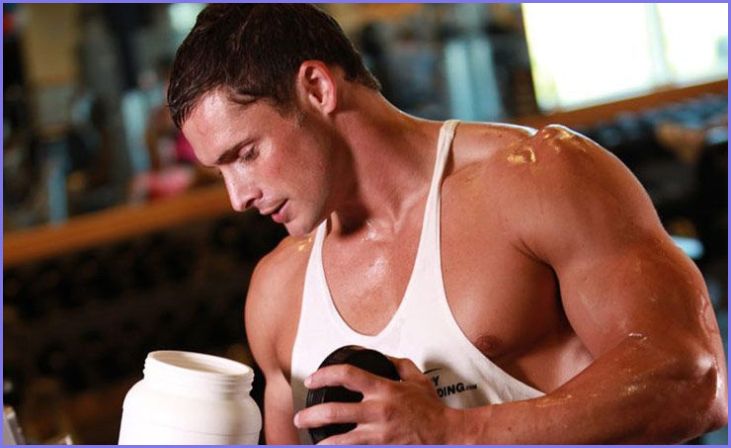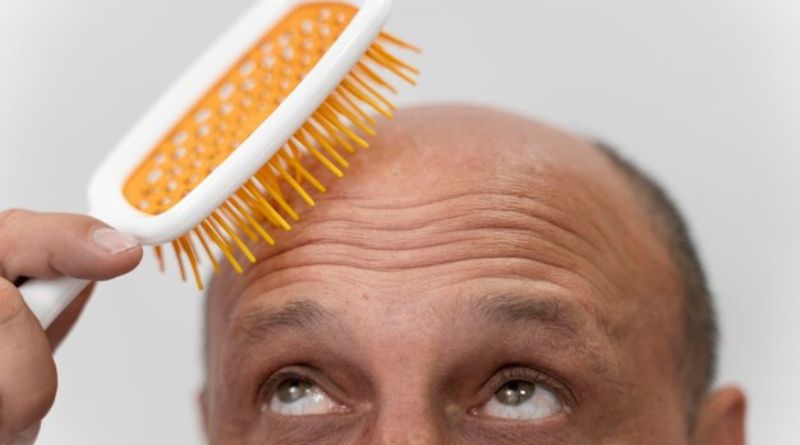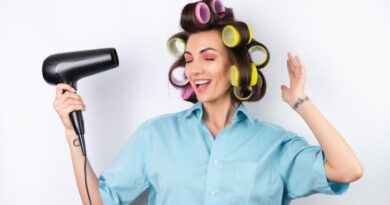Does Creatine Cause Hair Loss – There is no conclusive evidence linking creatine supplementation to hair loss. Creatine is a naturally occurring compound in the body and is widely used as a supplement to enhance athletic performance.
Some concerns about creatine and hair loss have arisen due to its potential to increase dihydrotestosterone (DHT) levels. DHT is associated with hair loss in genetically predisposed individuals. However, existing research does not provide a clear consensus on this matter.
It’s essential to consider individual factors, genetics, and overall health when exploring any potential connections between creatine and hair loss. As of now, the scientific community lacks definitive proof to support the claim that creatine directly causes hair loss in individuals.
What exactly is creatine?

Creatine is one of the most extensively investigated supplements in the bodybuilding industry. It can be found in naturally occurring forms in animal products such as red meat, but it can also be purchased at virtually any big box or supplement store.
A large number of studies have connected creatine to increased strength, muscle mass, and athletic performance, as well as improved recovery after a training session.
There are various different types of creatine available on the market, but creatine monohydrate is the least priced and is believed to be equally as effective as, if not more effective than, the other variants.
The most prevalent negative effect of creatine supplementation is water retention, which can result in weight gain. Other possible side effects of creatine supplementation include muscle cramps, nausea, dizziness, stomach difficulties, dehydration, and heat sensitivity, among other things.
Creatine is not suggested for persons who have kidney illness or who are suffering from kidney complications.
Interestingly, hair loss is not listed as a negative effect of creatine in the most reliable web sources for supplement and health research, despite widespread belief.
Also, Read – Which Vitamin Deficiency Causes Hair Loss
What is the relationship between creatine and hair loss?
When researching rugby players in 2009, researchers used a creatine supplement protocol that included seven days of creatine loading, during which a larger dose of the supplement was administered. This was followed by a period of decreasing creatine levels in order to maintain the results.
Levels of DHT surged by more than 50%Trusted Source during the loading period and remained 40 percentTrusted Source higher than baseline during the maintenance period, according to the researchers. The amount of testosterone in the blood did not alter.
It is crucial to highlight that the researchers did not examine the subjects’ hair for signs of hair loss. As a result, we can only observe the influence on hormone levels in this setting.
It was discovered that DHT levels had increased. The fact that your DHT levels are increasing may put you at risk for hair loss, particularly if you are genetically susceptible to hair loss.
In general, more research into the effects of creatine on DHT levels is required. Further investigation should be carried out to determine whether increases in DHT as a result of creatine consumption are adequate to cause significant hair loss.
Creatine Side Effects That Could Occur
However, even though creatine is a natural substance, having excessive levels in your system might have adverse effects on certain organs and systems. While it is possible to take creatine orally at the prescribed doses, the long-term effects may be hazardous.
One or more of the following side effects, which usually reveal themselves after five years, can occur.
- Retention of water
- Hair loss is a common occurrence.
- Cramping of the muscles
- Fatigue sFever
- Nausea
- Dizziness
- Weight growth is a problem.
- Pain in the stomach and intestines
- Dehydration
- Hair loss is a common occurrence.
- Intolerance to high temperatures
Your overall bodily function as well as any underlying medical issues will influence the severity of these side effects. Some of the more severe adverse effects might result in organ damage, including kidney failure, liver failure, and heart failure.
What Is the Impact of Creatine on Your Hair?

There is insufficient research to determine whether creatine is harmful to one’s hair or not. Creatine, on the other hand, has been related to hair loss in certain studies, possibly because it raises the concentration of DHT in the body. DHT attaches to the hair follicles, causing the hair to become thinner and weaker, or worse, causing the individual to go bald.
What is the mechanism by which creatine increases DHT?
Creatine stimulates the production of DHT by turning testosterone into a more active metabolite. DHT is a more active form of testosterone, which is a male reproductive hormone that is also responsible for the development of new hair strands. Creatine indirectly contributes to hair loss by increasing DHT levels in the body.
What Is Dihydrotestosterone (DHT) and How Does It Work?
Dihydrotestosterone (DHT) is a hormone that is generated from testosterone, which is the major sex hormone in the male reproductive system. Aside from its action as a sex hormone, testosterone is known to play a significant role in the development of muscle mass and the growth of body hair. The reason for this is that men have far more hair than women on their heads and bodies.
Despite the fact that DHT is generated from testosterone, it is a much more powerful hormone. Because of this, testosterone can only perform its majority of the activities that it is designed to perform after it has been transformed to DHT. A large number of people, however, are unaware of the connection between this and several stages of male pattern baldness and other forms of hair loss.
Also, Read – Can Bed Bugs Live In Your Hair
Which dietary supplements are known to cause hair loss?
Supplementing with creatine may result in hair loss. Various studies have also discovered that over-supplementation or continuous usage of nutrients such as Vitamins A and E, as well as Selenium, might result in hair thinning.
Regardless of whatever vitamins are consumed, creatine appears to be one of the most common supplements associated with hair loss. For athletes and bodybuilders, this is especially true, since they rely on it for increased muscle growth as well as greater performance, endurance, and energy levels.
Scientific evaluation of creatine has provided the following facts:
- It is not always the case that creatine supplementation results in water retention.
- Creatine is not an anabolic steroid in the traditional sense.
- Individuals with normal kidney function do not experience kidney damage or renal failure when using creatine supplements at the prescribed levels.
- Currently available information does not show a link between creatine supplementation and hair loss / baldness in the vast majority of cases.
- Dehydration or muscle cramps are not caused by the usage of creatine supplements.
- Supplementing with creatine looks to be generally harmless and may even be advantageous for children and adolescents in some cases.
- Supplementing with creatine does not result in an increase in fat mass.
- It is useful to use smaller daily doses of creatine supplementation (3-5 grammes, or 0.1 gramme per kilogramme of body mass). In order to avoid this, there is no need for a ‘creatine loading’ phase.
- The vast majority of musculoskeletal and performance advantages in older adults are achieved by the combination of creatine supplementation with resistance training. Supplementing with creatine can provide some muscular and performance benefits for older persons who are otherwise inactive.
- When it comes to a range of athletic and sporting activities, creatine supplementation can be really advantageous.
- For females of all ages, using creatine supplements has a number of advantages, including increased strength and endurance.
- Other types of creatine do not outperform creatine monohydrate in terms of effectiveness.
Does creatine cause hair loss in females?

Creatine is a supplement taken usually by males. Creatine is found in foods such as red meat and fish. However, the reason why creatine causes hair loss in females is probably because of the increased testosterone levels in their body. Creatine can be a tough nutrient to process for females,
Conclusion
In conclusion, current evidence does not definitively establish a causal relationship between creatine supplementation and hair loss. While concerns about DHT levels exist, research is inconclusive. Individual factors such as genetics and overall health play a role in the potential impact on hair. It is advisable for those with specific concerns to consult healthcare professionals for personalized advice. As of now, the consensus is that, under normal conditions and recommended dosages, creatine is unlikely to directly cause significant hair loss in individuals.
FAQs
No conclusive evidence supports a direct link between creatine supplementation and hair loss. While there are concerns about increased DHT levels, existing research is inconclusive.
DHT (dihydrotestosterone) is a hormone associated with hair loss in genetically predisposed individuals. Creatine may influence DHT levels, but the impact on hair loss remains uncertain.
Research on the topic is limited, and existing studies do not provide consistent evidence supporting the idea that creatine causes hair loss.







